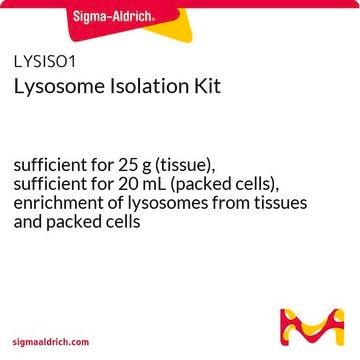GL0010
Golgi Isolation Kit
sufficient for 50 g (tissue)
Synonyme(s) :
Golgi Kit, Isolation Kit for Golgi
Se connecterpour consulter vos tarifs contractuels et ceux de votre entreprise/organisme
About This Item
Code UNSPSC :
12352200
Nomenclature NACRES :
NA.32
Produits recommandés
Utilisation
sufficient for 50 g (tissue)
Niveau de qualité
Technique(s)
fractionation: suitable
Conditions d'expédition
wet ice
Température de stockage
2-8°C
Description générale
The Golgi Isolation Kit provides a method for isolating Golgi membranes from mammalian soft tissues by discontinuous density gradient. The degree of Golgi enrichment can be determined by assaying the acitivty of UDP-galactosyl transferase or by immunodetection of Golgi specific marker proteins like B-COP or GM130 using appropriate antibodies (Cat. No. G6160 and G7295, respectively). Separation from other organelles can be measured using the appropriate marker detection kits (Cat. No. CS0780, CYTOCOX1, CY0100 and CAT100).
Application
Golgi Isolation Kit may be used for the isolation of Golgi membranes from mammalian soft tissues by discontinuous density gradient.
Remarque sur l'analyse
The Golgi Isolation kit was optimized using rat liver and tested on rat kidney, spleen, and heart.
Composants de kit également disponibles séparément
Réf. du produit
Description
FDS
- P8340Protease Inhibitor Cocktail, for use with mammalian cell and tissue extracts, DMSO solution 5 mLFDS
Code de la classe de stockage
10 - Combustible liquids
Classe de danger pour l'eau (WGK)
WGK 3
Faites votre choix parmi les versions les plus récentes :
Certificats d'analyse (COA)
Lot/Batch Number
Vous ne trouvez pas la bonne version ?
Si vous avez besoin d'une version particulière, vous pouvez rechercher un certificat spécifique par le numéro de lot.
Déjà en possession de ce produit ?
Retrouvez la documentation relative aux produits que vous avez récemment achetés dans la Bibliothèque de documents.
Les clients ont également consulté
A Surroca et al.
The Journal of membrane biology, 177(3), 243-249 (2000-10-03)
We investigated the direct effect of inositol 1,4,5-trisphosphate (IP(3)) and ryanodine receptor agonists on Ca(2+) release from vesicles of a rat liver Golgi apparatus (GA) enriched fraction, which were actively loaded with (45)Ca(2+). Results in GA were compared with those
Julien Villeneuve et al.
The Journal of cell biology, 217(2), 649-665 (2017-12-08)
An appreciation of the functional properties of the cytoplasmic fatty acid binding protein 4 (FABP4) has advanced with the recent demonstration that an extracellular form secreted by adipocytes regulates a wide range of physiological functions. Little, however, is known about
E Prchla et al.
The Journal of cell biology, 131(1), 111-123 (1995-10-01)
Endosomal penetration by nonenveloped viruses might be accomplished by either local breakdown of the endosomal membrane (e.g., adenovirus) or formation of a membrane-spanning pore by capsid proteins. Uncoating of the nonenveloped virus human rhinovirus serotype 2 (HRV2) has been shown
E R Sjoberg et al.
The Journal of biological chemistry, 268(14), 10185-10196 (1993-05-15)
The melanoma-associated disialogangliosides 9(7)-O-acetyl-GD3 and 9(7)-O-acetyl-GD2 have been structurally well characterized. However, the compartmentalization and sequence of action of the biosynthetic activities responsible for synthesizing these molecules remain obscure. Here, we have studied the spatial and temporal interrelationships among the
V J Allan et al.
The Journal of cell biology, 113(2), 347-359 (1991-04-01)
When higher eukaryotic cells enter mitosis, membrane organization changes dramatically and traffic between membrane compartments is inhibited. Since membrane transport along microtubules is involved in secretion, endocytosis, and the positioning of organelles during interphase, we have explored whether the mitotic
Notre équipe de scientifiques dispose d'une expérience dans tous les secteurs de la recherche, notamment en sciences de la vie, science des matériaux, synthèse chimique, chromatographie, analyse et dans de nombreux autres domaines..
Contacter notre Service technique










